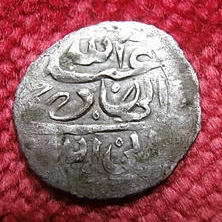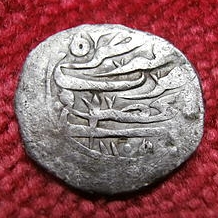
PREV ARTICLE
NEXT ARTICLE
FULL ISSUE
PREV FULL ISSUE
PIRATE YEMENI COINS IN COLONIAL AMERICARoss Johnson forwarded this Associated Press story about specimens of Arabian silver coins found by detectorists at Colonial Period sites in New England. -Editor
The villain in this tale: a murderous English pirate who became the world's most-wanted criminal after plundering a ship carrying Muslim pilgrims home to India from Mecca, then eluded capture by posing as a slave trader. "It's a new history of a nearly perfect crime," said Jim Bailey, an amateur historian and metal detectorist who found the first intact 17th-century Arabian coin in a meadow in Middletown. That ancient pocket change — among the oldest ever found in North America — could explain how pirate Capt. Henry Every vanished into the wind. On Sept. 7, 1695, the pirate ship Fancy, commanded by Every, ambushed and captured the Ganj-i-Sawai, a royal vessel owned by Indian emperor Aurangzeb, then one of the world's most powerful men. Aboard were not only the worshipers returning from their pilgrimage, but tens of millions of dollars' worth of gold and silver. What followed was one of the most lucrative and heinous robberies of all time. "If you Google ‘first worldwide manhunt,' it comes up as Every," Bailey said. "Everybody was looking for these guys." Until now, historians only knew that Every eventually sailed to Ireland in 1696, where the trail went cold. But Bailey says the coins he and others have found are evidence the notorious pirate first made his way to the American colonies, where he and his crew used the plunder for day-to-day expenses while on the run. The first complete coin surfaced in 2014 at Sweet Berry Farm in Middletown, a spot that had piqued Bailey's curiosity two years earlier after he found old colonial coins, an 18th-century shoe buckle and some musket balls. Waving a metal detector over the soil, he got a signal, dug down and hit literal paydirt: a darkened, dime-sized silver coin he initially assumed was either Spanish or money minted by the Massachusetts Bay Colony. Peering closer, the Arabic text on the coin got his pulse racing. "I thought, ‘Oh my God,'" he said. Research confirmed the exotic coin was minted in 1693 in Yemen. That immediately raised questions, Bailey said, since there's no evidence that American colonists struggling to eke out a living in the New World traveled to anywhere in the Middle East to trade until decades later. Since then, other detectorists have unearthed 15 additional Arabian coins from the same era — 10 in Massachusetts, three in Rhode Island and two in Connecticut. Another was found in North Carolina, where records show some of Every's men first came ashore. Bailey, whose day job is analyzing security at the state's prison complex, has published his findings in a research journal of the American Numismatic Society, an organization devoted to the study of coins and medals.
To read the complete article, see:
The story spread far and wide this week. Thanks also to Mark Holton (of New Brunswick, Canada), Len Augsburger, Leon Saryan, B.J. Herbison, Howard Berlin, Dick Hanscom, Arthur Shippee and others who passed along other versions of the article. We've discussed these finds before - see the earlier E-Sylum articles linked below. -Editor
To read the complete articles, see:
To read the earlier E-Sylum articles, see:
Wayne Homren, Editor The Numismatic Bibliomania Society is a non-profit organization promoting numismatic literature. See our web site at coinbooks.org. To submit items for publication in The E-Sylum, write to the Editor at this address: whomren@gmail.com To subscribe go to: https://my.binhost.com/lists/listinfo/esylum All Rights Reserved. NBS Home Page Contact the NBS webmaster 
|



